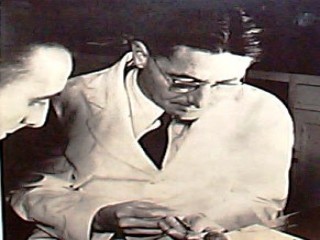
Howard Florey biography
Date of birth : 1898-09-24
Date of death : 1968-02-21
Birthplace : Adelaide, South Australia
Nationality : Australian
Category : Science and Technology
Last modified : 2011-06-23
Credited as : Pharmacologist and pathologist, Nobel Prize in Physiology or Medicine, Baron Florey
Howard W. Florey, the son of Joseph Florey, was born on Sept. 24, 1898, at Adelaide. After attending St. Peter's Collegiate School and Adelaide University (1916-1921), where he received a degree in medicine, he entered Magdalen College, Oxford, as a Rhodes scholar in 1921 and then Cambridge University in 1924. During 1925-1926 he was Rockefeller traveling fellow in the United States. In 1926 he was appointed Freedom research fellow at Cambridge. In the same year he married Mary Ethel Reed; they had two children.
Florey became successively Huddersfield lecturer in special pathology at Cambridge University in 1927, Joseph Hunter professor of pathology at the University of Sheffield in 1931, and professor and head of the Sir William Dunn School of Pathology at Oxford University in 1935, a position which he held until 1962, when he resigned to become provost of Queen's College, Oxford. In 1935 he invited the chemist Ernst B. Chain to Oxford to direct the work of the biochemistry department. After numerous vicissitudes Florey and Chain succeeded (1940-1941) in isolating the drug penicillin in completely purified form, which turned out to be a million times more active than the crude substance first observed in 1928 by Alexander Fleming. Penicillin is usually measured in Oxford units, also called Florey units. In 1941 the Rockefeller Foundation brought Florey to the United States to persuade American authorities of the need to make major facilities available for the rapid development of penicillin production. His journey was eminently successful, and by the last stages of World War II large amounts of penicillin were in clinical use.
The research interests of Florey were wide-ranging, and he remained an active laboratory investigator all his life. Throughout his career he was preoccupied with the structure and function of the smaller blood vessels and their relation to the movement of lymph and cells in inflammation. His work on lysozyme led to his general study of antibiotics in collaboration with Chain. In temperament Florey was reserved but sure of himself. He was above all a skilled experimentalist with little liking for speculation.
Florey was the recipient of numerous prizes, honors, and honorary degrees, including the Nobel Prize in physiology or medicine in 1945; he was created a baron in 1965. In 1944 he became Nuffield visiting professor to Australia and New Zealand. He was largely responsible for the detailed
planning and policy of the John Curtin School of Medical Research of the Australian National University. In 1965 he became chancellor of this university. He died on Feb. 21, 1968.
















